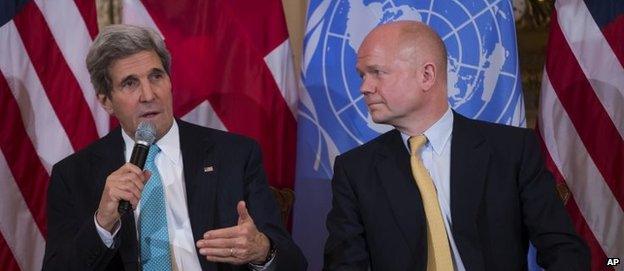Ukraine - what is cost for Putin?
- Published

John Kerry and William Hague, pictured here in the US last week, struck different tones on Russia
After Prime Minister David Cameron spoke to President Barack Obama last night their staff issued a statement saying that they agreed there must be "significant costs" to Russia if it did not change course on Ukraine.
Compare and contrast, however, the tone struck on each side of the Atlantic:
"He is not going to have a Sochi G8, he may not even remain in the G8 if this continues. He may find himself with asset freezes, on Russian business, American business may pull back, there may be a further tumble of the rouble."
AND
"There will be significant costs... I don't want to anticipate what those will be."
Britain's softly spoken diplomatic Foreign Secretary William Hague (speaking second) sounded very different on the BBC's Today programme to US Secretary of State John Kerry speaking to NBC's Meet the Press.
When challenged Hague made clear that his focus was on influencing Russia's behaviour in future and not punishing its actions to date.
Whilst he was clear that Russia's behaviour was unacceptable and a serious violation of Ukraine's sovereignty the foreign secretary sounded almost John Major-esque when he said that "a good deal of the trust between Russia and other western nations has been damaged".
He said he did not want to pre-empt discussions by EU foreign ministers this afternoon.
Why might this be ? Here are a few thoughts:
Britain is treating Crimea as different from the rest of Ukraine. The diplomatic focus is on persuading the Russians not to cross the Eastern border and persuading the Ukrainian authorities not to give them an excuse to do so
A full blown crisis in Ukraine would be a crisis on Europe's front doorstep not America's. In London and Berlin officials are already worrying about where the refugees might go
Britain's response is shaped more by Germany and the EU than the US. Chancellor Merkel is advocating dialogue not threats
The US response is conditioned by a widespread view in American politics that for the second time (the first being over Syria) President Obama's "red line" has been crossed with no apparent consequence. See, for example, yesterday's Washington Post editorial: "It took Vladimir Putin less than a day to trample on President Obama's warning against a Russian military intervention in Ukraine... The United States now faces a naked act of armed aggression in the centre of Europe by a Russian regime that is signalling its intent to steamroller this US president and his allies. Mr Obama must demonstrate that can't be done."
The consequence is clear, though - President Putin calculates that the west may huff and puff but they probably won't act.